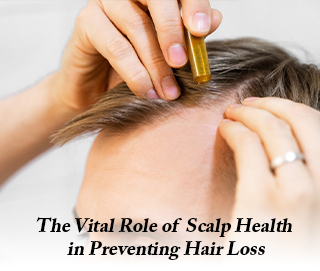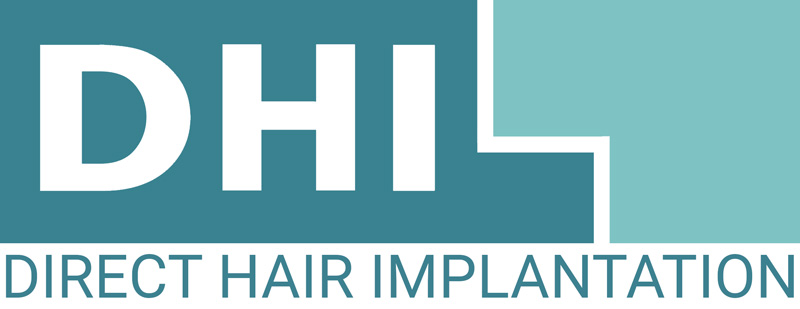The Vital Role of Scalp Health in Preventing Hair Loss

In the realm of hair health and restoration, the significance of a healthy scalp often takes a backseat to the quest for luscious locks. Yet, a healthy scalp is the foundation upon which thriving hair growth rests.
At DHI Hair Restoration Clinic, we understand that an unhealthy scalp can lead to hair loss, and we are dedicated to shedding light on the importance of scalp health in preventing this concern.
Understanding Hair Loss
Hair loss, or alopecia, is a common concern affecting millions worldwide. It can be triggered by various factors, including genetics, hormonal changes, medical conditions, medications, and poor lifestyle habits. However, one often overlooked factor is the condition of the scalp. It’s essential to recognise that hair is an extension of the skin, and its health begins at the root – the scalp.
The Role of the Scalp in Hair Health
The scalp isn’t just a mere covering for the head; it’s a dynamic ecosystem that directly influences hair health. Hair follicles, the tiny structures responsible for hair growth, are embedded within the scalp. A nourished and oxygenated scalp ensures that hair follicles receive the nutrients and support they need to produce strong, healthy hair.
Common Scalp Issues Leading to Hair Loss
When it comes to maintaining a luxurious mane, the focus is often on the hair itself – the products, styles, and treatments that enhance its appearance. However, an integral factor in the health and vitality of your hair is often overlooked: the condition of your scalp. A healthy scalp serves as the nurturing ground for robust hair growth, while various scalp issues can significantly contribute to hair loss.
Let’s delve into some common scalp issues that can lead to hair loss and understand their impact.
Dandruff: This familiar scalp woe isn’t just an aesthetic nuisance; it can have a direct impact on your hair health. Dandruff, caused by the overgrowth of a yeast-like fungus, leads to flaking, itching, and inflammation. The constant itching can weaken hair follicles, causing hair to become brittle and prone to breakage.
Seborrheic Dermatitis: A more severe form of dandruff, seborrheic dermatitis is characterised by red, itchy, and scaly patches on the scalp. The inflammation associated with this condition can disrupt the hair growth cycle, leading to temporary hair loss.
Psoriasis: Psoriasis is an autoimmune condition that results in the rapid buildup of skin cells. When it occurs on the scalp, it can lead to thick, silvery-white scales and red patches. The inflammation and constant shedding of skin cells can obstruct hair follicles and interfere with hair growth.
Fungal Infections: Fungal infections like ringworm can affect the scalp, leading to hair loss in affected areas. These infections cause intense itching, scaling, and hair breakage, ultimately contributing to noticeable hair thinning.
Alopecia Areata: This immune system attacking hair follicles results in sudden hair loss, often in small, round patches. While the exact cause of alopecia areata is still unclear, it is believed to be related to genetics and immune system dysfunction.
Folliculitis: This condition arises when hair follicles become inflamed due to bacterial or fungal infections. The resulting inflammation can weaken hair roots, leading to hair shedding and thinning.
Poor Scalp Hygiene: Regular cleansing is crucial for maintaining a healthy scalp environment. Poor scalp hygiene can lead to the accumulation of excess sebum, dirt, and debris, clogging hair follicles and hampering hair growth.
Addressing these common scalp issues is essential to prevent or mitigate hair loss. While some mild conditions can be managed with over-the-counter treatments, it’s crucial to consult a dermatologist for accurate diagnosis and appropriate treatment, especially if the hair loss becomes noticeable or persistent. Keeping your scalp clean, adopting a balanced diet rich in nutrients, and practising stress management techniques also contribute to overall scalp health and strong, vibrant hair.
Nurturing a healthy scalp is paramount for ensuring optimal hair growth and preventing hair loss. By understanding and addressing common scalp issues, individuals can pave the way for a thriving crown of hair that exudes confidence and vitality.
Maintaining a Health Scalp for Hair Loss Prevention
When it comes to maintaining a luxurious mane, the focus is often on the hair itself – the products, styles, and treatments that enhance its appearance. However, an integral factor in the health and vitality of your hair is often overlooked: the condition of your scalp. A healthy scalp serves as the nurturing ground for robust hair growth, while various scalp issues can significantly contribute to hair loss.
Addressing these common scalp issues is essential to prevent or mitigate hair loss. While some mild conditions can be managed with over-the-counter treatments, it’s crucial to consult a dermatologist for accurate diagnosis and appropriate treatment, especially if the hair loss becomes noticeable or persistent. Keeping your scalp clean, adopting a balanced diet rich in nutrients, and practising stress management techniques also contribute to overall scalp health and strong, vibrant hair.
In conclusion, nurturing a healthy scalp is paramount for ensuring optimal hair growth and preventing hair loss. By understanding and addressing common scalp issues, individuals can pave the way for a thriving crown of hair that exudes confidence and vitality.
Maintaining a Healthy Scalp for Hair Loss Prevention
In the quest for lustrous locks and vibrant hair, the importance of a healthy scalp often goes underestimated. A well-nurtured scalp is not only the foundation of robust hair growth but also a critical component in the prevention of hair loss.
Let’s explore the key strategies for maintaining a healthy scalp to safeguard against hair loss.
Regular Cleansing: Just as cleanliness is essential for overall health, it’s vital for scalp health as well. Regular cleansing helps remove excess oil, sweat, dirt, and product buildup that can clog hair follicles and impede hair growth. Opt for mild, sulphate-free shampoos that clean without stripping the scalp of its natural oils.
Nourishing Products: Select hair care products enriched with ingredients that promote scalp health, such as tea tree oil, aloe vera, and salicylic acid. These components help maintain a balanced scalp environment and reduce the risk of common scalp issues that contribute to hair loss.
Scalp Massages: A soothing scalp massage not only feels heavenly but also stimulates blood circulation to the hair follicles. Improved blood flow means better delivery of nutrients to the hair roots, fostering a healthier environment for hair growth.
Exfoliation: Regular exfoliation, using gentle scrubs or specialised exfoliating brushes, can help remove dead skin cells and unclog hair follicles. This practice ensures that hair follicles remain unobstructed, facilitating unhindered hair growth.
Balanced Diet: What you consume directly impacts your scalp health and hair growth. A diet rich in vitamins, minerals, and protein provides the necessary building blocks for healthy hair follicles. Include foods like leafy greens, lean proteins, nuts, and fish to nourish your scalp from within.
Hydration: Just as your body needs water to function optimally, your scalp requires adequate hydration too. Drinking enough water keeps your scalp moisturised, preventing it from becoming dry and flaky, which can hinder hair growth.
Stress Management: Chronic stress can wreak havoc on your scalp health and hair growth. Practising stress management techniques like yoga, meditation, or mindfulness can reduce stress levels, promoting a more conducive environment for hair growth.
Avoid Over-Styling: Excessive heat styling, tight hairstyles, and chemical treatments can damage both your hair and scalp. Opt for gentle styling practices and give your scalp a break from harsh treatments to maintain its health.
Regular Check-ups: Just as you’d visit a dentist for oral health, consider consulting a dermatologist specialising in scalp care. They can diagnose and address any underlying scalp issues that might contribute to hair loss.
A healthy scalp isn’t just about preventing hair loss; it’s about fostering an environment where your hair can thrive. By incorporating these practices into your hair care routine, you’re investing in not just your hair’s appearance but its overall health. Remember, a vibrant head of hair starts with a well-cared-for scalp.
Seeking Professional Help
While over-the-counter products can offer initial relief, it’s prudent to consult a dermatologist specialising in scalp care. These professionals can diagnose underlying scalp issues, recommend personalised treatments, and provide guidance on the best scalp care practices. Early intervention under the guidance of a dermatologist can often prevent minor scalp issues from evolving into severe hair loss problems.
Lifestyle Habits for Scalp and Hair Health
A holistic approach to scalp health involves adopting lifestyle habits that benefit not only the scalp but overall well-being. A balanced diet rich in vitamins, minerals, and proteins supports hair follicle health. Adequate hydration, stress management, and regular exercise also contribute to a healthier scalp and improved hair growth.
Addressing Myths and Misconceptions about Scalp Health and Hair Loss
There are many misconceptions surrounding scalp health and hair loss. One prevalent myth is that frequent shampooing causes hair loss. In reality, proper cleansing removes excess sebum and debris, promoting a healthier scalp environment. Similarly, wearing hats or using hair products doesn’t directly lead to hair loss if scalp hygiene is maintained.
In the realm of hair restoration, a focus on scalp health is paramount. An unhealthy scalp can create a hostile environment for hair follicles, leading to hair loss. At our distinguished hair restoration clinic, we emphasise the pivotal role of a nourished scalp in maintaining a full and vibrant head of hair. By understanding common scalp issues, seeking professional guidance, adopting a healthy lifestyle, and debunking myths, individuals can pave the way for scalp and hair health that lasts a lifetime. Remember, a healthy scalp is not just the foundation of great hair – it’s the key to confidence and self-assurance.
